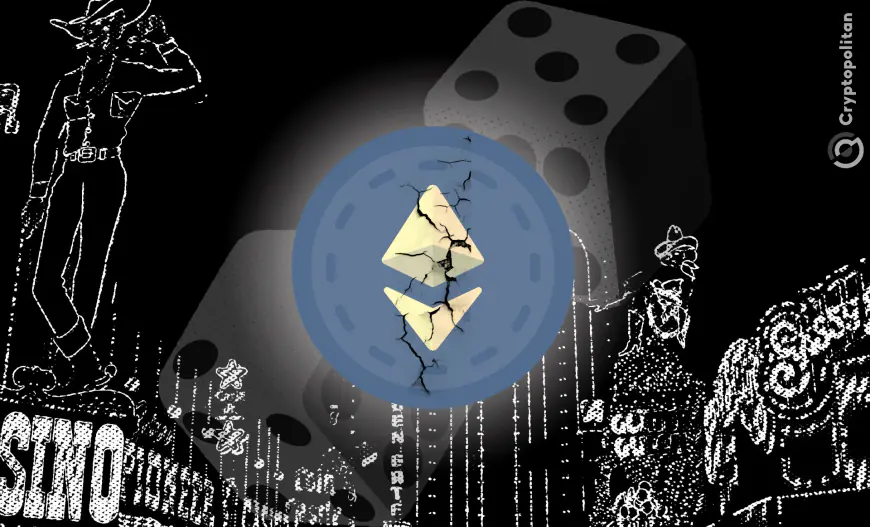ZKasino users wait for months as ETH refund delays persist
According to reports from users, the Web3 gambling protocol ZKasino had not refunded the promised Ether even after it launched a “signup” app to effect the return of user funds over two months ago. Despite promising to repay user funds in May 2024, users claimed that the app collected their $ZKAS tokens and gave back nothing.

According to reports from users, the Web3 gambling protocol ZKasino has not reimbursed the promised Ether even after it launched a “signup” app to effect the return of user funds over two months ago. Despite promising to repay user funds in May 2024, users claimed that the app collected their $ZKAS tokens and gave back nothing.
One user who chose to remain anonymous revealed losing retirement savings equivalent to a year’s salary and not getting it back despite promises from ZKasino’s team to do so. The platform finally announced on August 14 that it would ‘actively’ cooperate with relevant departments to provide the maximum possible compensation for all the investors affected.
ZKasino defrauds users, breaks a promise to refund vanished funds
I'm gonna lay this out since it gets worse and worse everyday.
Multiple people have approached me in the past week with allegations that the @ZKasino_io team owes them money or defrauded them in some way.
Multiple former employees and contractors have contacted me to let me…
— ZigZag (@ZigZagExchange) March 23, 2024
According to the Zigzag exchange, three out of the five signers on the ZigZag multisig stole from the ZigZag Treasury to fund the controversial Web3 gambling platform ZKasino. ZigZag disclosed that the three took out money claiming to pay devs building the ZigZag frontend but instead used the funds to build the Web3 gambling platform.
The Web3 gambling team announced on May 28 that it was initiating a 2-step bridge back process for bridgers (users) to sign up and bridge back their Ether at a ratio of 1:1. According to ZKasino, bridgers had 72 hours until May 31 to sign up by depositing their ZKAS bridge rewards. However, the Web3 gambling platform published a statement on August 14 saying that recovering all investor losses would be a great challenge owing to the platform’s financial situation.
Notably, Crypto sleuth (and victim) DKCrypto revealed that the ‘deposit to earn’ scheme launched on March 15, promising depositors would get their $ZKAS tokens and all ‘bridged/deposited’ Ether back in their wallets, was never delivered. According to the crypto detective, the Ether was not an investment received in exchange for $ZKAS but a reward to users for bridging funds into the new ZKasino network.
Importantly, DKCrypto claimed that his funds were never returned despite assurances from the Web3 gambling team that the Ether deposited would be refunded. Instead, the Web3 gambling platform announced on April 22 that users would no longer be allowed to bridge their Ether back to the mainnet, but they would receive $ZKAS coins in exchange for their deposited Ether.
“All bridged Ethereum has been converted to our native gas token, ZKAS, at a discounted rate of $0.055,” said the ZKasino team.
Authorities crackdown on the Web3 gambling platform as investors count losses
According to DKCrypto, the gambling platform’s decision to block Ether withdrawals has triggered law enforcement action. The crypto detective clarified on an X post that the Dutch police had arrested ZKasino’s co-founder, Elham Nourzai, who goes by the X handle Derivatives Monke. He also asked the co-conspirator, Ildar I. A (Prometheus on X) to turn himself in.
DKCrypto claimed that the Dutch authorities referred to the ZKasino project as an “exit scam.” By seizing assets connected to ZKasino worth $12 million, Dutch authorities charged Elham with embezzlement, fraud, and money laundering.
Elham stated on May 9 – 19 days before the signup app launch—that the Web3 gambling project was not a scam and that all Ether was safely secured in the ZKasino Multisig. Nonetheless, the transfer of 26.6 million ZKAS tokens to the project team’s wallet implied that ZKasino founders had taken possession of the ZKAS deposited by users.
What's Your Reaction?









































































































